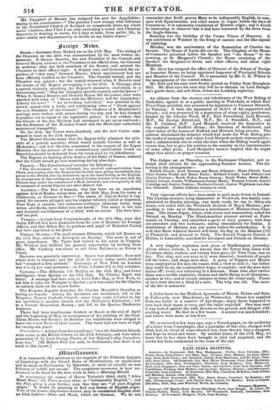gOtEittll 1 41 7EWS.
SPAIN.—Acoonnts from Madrid are to the 27th May. The sitting of
the Deputies on the 20th was characterized by the most violent de- meanour. S. Gomez Becerra, the new President of the Council, and General Hoyos, entered it, the President in his official dress, the General in uniform: they are both members of the Senate, and entered the Chamber in their official right. A Deputy rose, and demanded the ex- pulsion of "that man," General Hoyos; whose appointment had not been officially notified to the Chamber. The General retired, and the Chamber was quieter ; but the tumult renewed when S. Becerra read the decree of the Regent proroguing it to the 27th. S. Olozaga, after a speech violently attacking the Regent's measures, exclaimed, in a threatening tone, "May the Almighty save the country and the Queen !" When S. Gomez Becerra and General Hoyos left the palace, they were ,assailed with cries of " Down with the Ministers and the Ayaeuchos ! Liberty for ever ! " " An ill-looking individual" was arrested in the crowd, armed with a knife, and vociferating cries of "Death against the new President of the Council." The windows of S. Mendizabel's carriage were broken with stones during the day, and he had deemed it prudent not to repair to the legislative palace. It was evident that the friends of the late Ministry had attempted to get up an outbreak ; but the firmness of the National Guard and the Municipal authorities maintained tranquillity. On the 26th, the Cortes were dissolved, and the new Cones sum- moned to meet on the 27th August.
The Madrid Gazette states that the Regent fully admitted the prin- ciple of a general amnesty, which would include Carlists as well as Moderados ; and had likewise acquiesced in the request of the Lopez Ministry that the amount of the extraordinary contribution levied on Barcelona should be deducted from the taxes paid by its inhabitants.
The Regent, on hearing of the demise of the Duke of Sussex, ordered that the Court should go into mourning during nine days. FRANCE.—The Constitutionnel contains the following- " The Governmant, we are informed, has received communications from China, announcing that the Emperor has decided upon giving immediately free access to the French into his dominions, upon the same footing as the English. In consequence of this intelligence, a naval division is about to be sent into the Chinese seas, under the command of a Rear-Admiral; and consequently it will be composed of several frigates and other ships of war.
Atmeara.—The Due d'Aumale, who has been on an expedition against Abd-el-Kader, writes thus on the 20th May, from his camp at Chabonnia, to General de Bar—" The smala of Abd-el-Kader is cap- tured, his treasure pillaged, and his regular infantry killed or dispersed. Four flags, a cannon, two ordnance-carriages, immense booty, large tribes and flocks, have fallen into our hands." The smala is the tent and domestic establishment of a chief, with its escort. The hero him- calf escaped. escaped.
TURKEY.—Letters from Constantinople, of the 10th May, state that Sarim Effendi had been dismissU from the post of Minister for Foreign Affairs, and that Rifaat Bey (a partisan and pupil of Redsehid Pasha) had been appointed in his place.
UNITED STATES.—The mail-steamer Hibernia, which left Boston on the 16th May, arrived at Liverpool on Sunday. The news is not of great importance. Mr. Tyler had retired to his estate in Virginia. Mr. Webster had fulfilled the general expectation by retiring from office. Mr. Cushing was about to sail from Baltimore, as Envoy to China.
Business was generally improving. Specie was abundant ; flour and
wheat were in demand ; and the stock of cotton being small, holders had "assumed a firm attitude." Exchange at New York on London was 8 to 8; per cent premium ; on Paris, 5 francs 27f to 321 centimes.
CANADA.—The Hibernia left Halifax on the 18th May, and bears intelligence from Quebec to the 10th May. Sir Charles Bagot was better. A message had been sent to Lord John Hay, at New York, to ask him to take the Warspite to Quebec ; as it was easier for Sir Charles to embark there on his return home.
The Kingston Loyalist describes Sir Charles Metealfe's liberality as having no bounds. Among his donations are mentioned, 50/. to the Kingston Roman Catholic Church ; some large sums (alluded to, but not specified) to another church and the Mechanics Institution ; 10/. to a Female Benevolent Society ; and 501. to the Quebec Mechanics Institute.
There had been troublesome freshets or floods at the end of April and the beginning of May, in consequence of the yielding of the frost. Three Rivers was flooded ; in Berthier the inhabitants were obliged to leave the lower floors of their houses. The water had not been so high for twenty-six years.
POLYNESIA.— A letter from Liverpool says "that the Sandwich Islands were ceded to the British Crown on the 25th February, and were taken possession of by Lord George Paulet, of her Majesty's ship Carysfort, next day." [Sir Robert Peel has said, in Parliament, that there is no truth iu this report.]


























 Previous page
Previous page